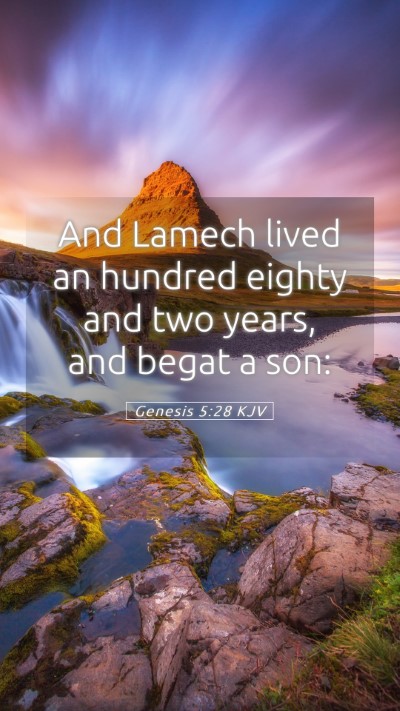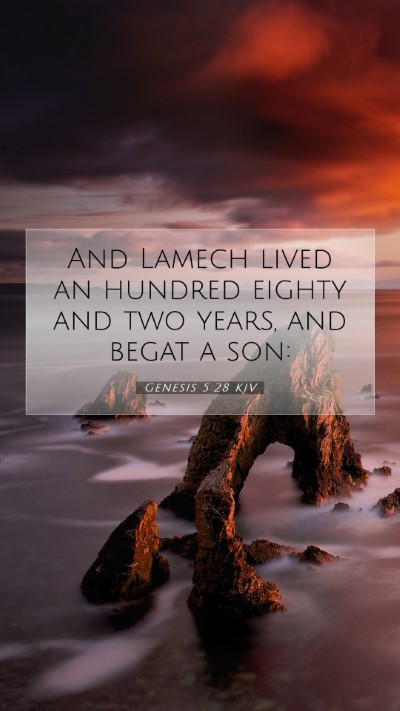Understanding Genesis 5:28
Genesis 5:28 states: "And Lamech lived a hundred eighty and two years, and begat a son." This verse marks a significant moment in the lineage of Adam, emphasizing both the age of Lamech at the birth of his son and the continuity of God's creation through generations. In this analysis, we will explore the meaning of this verse through insights derived from public domain commentaries, focusing on its theological implications, historical context, and relevance in biblical narratives.
A closer examination reveals that Lamech is part of the genealogical record, illustrating God's plan over generations. Commentators like Matthew Henry observe the importance of family lineage in this context, highlighting how each name mentioned bears significance in the divine scheme of salvation.
- Matthew Henry: Henry points out that the long lives of the antediluvians, including Lamech, demonstrate God's mercy and patience, affording humanity extended time for repentance before the flood.
- Albert Barnes: Barnes interprets Lamech's name and the context surrounding it. He suggests that Lamech's life cycle and his father's expectations foreshadow later biblical narratives that revolve around hope and inheritance.
- Adam Clarke: Clarke provides an exegesis that links Lamech's life to the greater Ark narrative. He notes that the mention of a son at the age of 182 represents the anticipation of future generations and their roles in the unfolding story of redemption.
Key Themes and Insights
The key themes extrapolated from Genesis 5:28 include:
- Generational Continuity: This verse emphasizes the passing of life and purpose through generations, reinforcing God's covenant with humanity.
- Hope in Lineage: The fact that the birth of a son is emphasized indicates hope for humanity's future amidst chronicled hardships.
- Historical Context: Understanding the societal and cultural implications of biblical genealogies gives depth to one’s Bible study insights on divine providence.
Cross-References
Related verses that further illuminate Genesis 5:28 include:
- Genesis 5:25-26: Discusses the birth of Methuselah and the longevity of the patriarchs.
- Genesis 4:25-26: Chronicles the lineage after Cain, setting the stage for Lamech's introduction.
- Hebrews 11:4: Offers insight into the importance of faith in the lives of early biblical figures, including those in Lamech's lineage.
Conclusion: Significance of Genesis 5:28
In conclusion, Genesis 5:28 serves as a pivotal point of understanding Scriptures surrounding human ancestry. It encapsulates themes of hope, continuity, and divine providence. Through in-depth Bible verse analysis and commentary, modern readers are invited to apply the rich historical and spiritual lessons gleaned from this passage to their lives today. Whether studying in groups or individually, these insights offer profound context to one’s Bible study resources and tools.
Engaging with the Scripture in this way not only enhances biblical exegesis but also enriches one’s relationship with God and understanding of His plans for humanity throughout history. For those seeking clarity on how to interpret Bible verses or the significance of specific scriptural passages, detailed study of verses like Genesis 5:28 is essential.


